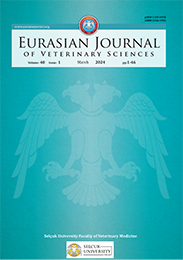| 1994, Cilt 10, Sayı 1-2, Sayfa(lar) 058-062 |
| [ Türkçe Özet ] [ PDF ] [ Benzer Makaleler ] |
| The Effect of Hypothyroidism on Certain Metabolites of Blood and Ruminal Content and Body Weight Gain in The Sheep |
| Tufan Keçeci1, Mehmet Kocabatmaz2 |
| 1Dr. S.Ü. Veteriner Fakültesi, Fizyoloji Anabilim dalı, Konya 2Prof. Dr., S.Ü. Veteriner Fakültesi, Fizyoloji Anabilim dalı, Konya |
| Keywords: Sheep, Hypothyroidism, Ruminal Content, Blood Metabolites, Body Weight |
| Downloaded:1440 - Viewed: 2514 |
|
In the experiment, the male merino lambs which were at the same age and similar body weight were used. The animals were divided into 5 groups as Control, Group 1 -A, Group 1 -8, Group 2-A and Group 2-B. During the first 3.5 month, hypothyroidism was induced in the animals except control ones by administration ol thiourea. Then, thiourea administration was lasted and potassium iodide (Kl) was given to the animals in the Group f -B and Group 2-B for 3.5 month.
Both ol the total thyroxine and triiodothyronine levels decreased in the animals which were given thiourea. Because of hypothyroidism, body weight gain, ruminal pH. ruminal protozoa count and ruminal total volatile fatty acids levels decreased. However, ruminal and blood ammonia nitrogen levels and ruminal bacteria counts increased. The parameters of the animals those were given Kl. reached af the levels of control ones. In the animals not given Kl, the increase ol those parameters were at lower levels. At the end of the experiment, the mean body weight of control animals was 65 kg and the animals those were given Kl at the end of the hypothyroidism was 56 kg. Whereas, it was rather lower (45 kg) in the hypothyroidism induced but not given Kl animals. This differences in body weight gain have an economical importance. |
| [ Türkçe Özet ] [ PDF ] [ Benzer Makaleler ] |




